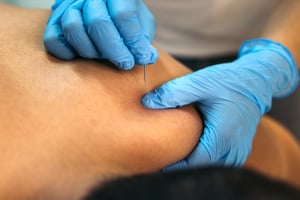When it comes to rehabilitation and training, a one-size-fits-all approach rarely delivers the best...
From Resolution to Rebuilding: Navigating the Path to Recovery
Recovering from an injury or surgery is more than just waiting for the pain to fade—it’s a journey that requires dedication, the right guidance, and a structured plan. Many people focus on the resolution of their symptoms, but true healing extends beyond simply feeling better. The transition from pain relief to full function is where physical therapy plays a crucial role.
At Promotion Performance Therapy in Cheshire, CT, we specialize in helping individuals navigate this journey. Through targeted treatments and customized recovery plans, we ensure that every step—from reducing pain to regaining strength—is optimized for long-term success. Whether you’re an athlete aiming to return to peak performance or someone looking to restore daily mobility, the right approach to recovery can make all the difference.

Understanding the Recovery Process
Recovery isn’t a one-size-fits-all journey—it happens in stages, each requiring different levels of care and attention. Whether you’re healing from surgery, an injury, or chronic pain, understanding these phases can help you set realistic expectations and stay motivated.
1. Acute Care (Pain & Inflammation Management)
This initial stage focuses on reducing pain, swelling, and protecting the injured area. Rest, ice, compression, and elevation (R.I.C.E.) may be used alongside manual therapy to promote healing.
2. Rehabilitation (Restoring Movement & Strength)
As pain decreases, the focus shifts to regaining mobility, flexibility, and strength. Physical therapists use targeted exercises to rebuild muscle function and prevent stiffness.
3. Rebuilding Strength (Returning to Full Activity)
The final stage ensures the body can handle daily activities, sports, or work-related movements without risk of re-injury. Advanced strength training, balance exercises, and functional movements are integrated to prepare for long-term success.
Skipping or rushing through any of these phases can lead to setbacks. That’s why working with a skilled physical therapist ensures each step is done safely and effectively.
How Physical Therapy Supports Long-Term Healing
Recovery isn’t just about getting back to normal—it’s about rebuilding a stronger, more resilient body to prevent future injuries. Physical therapy plays a crucial role in this process by using evidence-based techniques that support long-term healing.
- Manual Therapy for Pain & Mobility
Hands-on techniques like joint mobilization and soft tissue massage help improve circulation, reduce stiffness, and promote healing. - Targeted Exercises for Strength & Stability
A structured exercise program strengthens weakened muscles, restores joint stability, and improves overall movement patterns to reduce the risk of re-injury. - Personalized Treatment Plans
Every recovery journey is unique. A customized plan ensures that therapy aligns with your specific goals—whether it’s returning to sports, improving daily mobility, or enhancing overall physical function.
By focusing on long-term recovery rather than just short-term pain relief, physical therapy helps individuals regain confidence in their movements and maintain an active lifestyle.
Common Challenges in Recovery & How to Overcome Them
The road to recovery isn’t always smooth. Many people experience setbacks that can slow progress or cause frustration. However, understanding these challenges and knowing how to navigate them can make a significant difference in achieving a full recovery.
Slow Progress or Plateaus
Recovery isn’t always linear—some weeks you may see improvement, while others feel stagnant. The key is consistency. Sticking to your therapy plan and trusting the process will lead to gradual, long-term gains.
Pain Flare-Ups
Experiencing discomfort during recovery is normal, but it shouldn’t be ignored. Pain often signals areas that need more attention or a modified approach. A physical therapist can adjust your treatment plan to keep you on track without aggravating your condition.
Lack of Motivation or Confidence
Staying committed can be tough, especially if progress feels slow. Setting small, measurable goals and celebrating milestones—like improved range of motion or increased strength—can keep you motivated and focused.
At-Home Care & Compliance
Recovery doesn’t stop when you leave the clinic. Following prescribed exercises at home, maintaining proper posture, and incorporating healthy movement into daily routines all contribute to long-term success.
By recognizing and addressing these challenges, you can stay on course and reach your recovery goals with confidence.
Taking the Next Step Toward Full Recovery
Recovering from an injury or surgery is a journey, but you don’t have to navigate it alone. At Promotion Performance Therapy in Cheshire, CT, we specialize in helping individuals move beyond pain relief and toward long-term strength and mobility.
If you’re ready to take control of your recovery and rebuild your body with expert guidance, now is the time to act. Our personalized physical therapy programs are designed to support you at every stage—from managing discomfort to regaining full function.
Book a call today to start your recovery journey with a customized treatment plan. Visit our scheduling page to get started.
-1.png?width=1269&height=380&name=Your%20paragraph%20text%20(13)-1.png)

.jpg?height=200&name=Thunder%20Valley%20Physio%2c%20John%20Doe%20DPT%2c%20Seneca%2c%20South%20Carolina%20(15).jpg)
